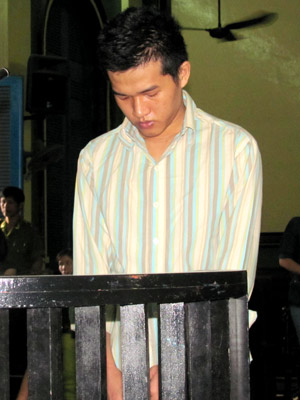PARIS, 24 July 2010 (VIETNAM COMMITTEE) – Mr. Vo Van Ai, President of the Paris-based Vietnam Committee on Human Rights, an affiliate of the International Federation on Human Rights (FIDH) sent a letter today to Vietnamese President Nguyen Minh Triet calling on him to lift the death sentence on Phan Minh Man, a 20 year-old student condemned to death on 17 July 2010 by the People’s Court in Ho Chi Minh City (Saigon) for the murder of his alcoholic father who savagely beat his mother and other members of the family.
 |
|
|
Phan Minh Man at his trial on 17.7.2010 – Photo Vu Mai
|
Vo Van Ai called for a presidential pardon for Phan Minh Man, a brilliant student from a poor family, whose crime, he wrote, “results from social tragedy rather than juvenile delinquency”, and underscores the grave economic and social problems facing Vietnam today. Phan Minh Man’s father, a truck driver, sank into despair and alcoholism after work became scarce and he received no State benefits to help him provide for his family. He “turned his anger against his wife and children, frequently beating them almost to death”.
This crime reflects the rising incidence of domestic violence in Vietnam. Despite the government’s claims that it respects gender rights, the situation of women is particularly disturbing in Vietnam. Pham Minh Man’s gesture was perhaps the only way he could save his mother. Mr. Ai recalled that one woman dies from domestic violence every three days in Vietnam.
By implementing the death sentence on Pham Minh Man without any regard for attenuating circumstances, said Mr. Ai, the government is turning a blind eye to the hardships and sufferings of its people, and preferring repression over prevention to settle social and economic challenges.
Mr. Vo Van Ai called on the Vietnamese President to grant a pardon to Phan Minh Man, and urged Vietnam to “join the ranks of civilized countries” by moving towards abolishment of capital punishment. (See full text of the letter below and see also The Death Penalty in the Socialist Republic of Vietnam, report prepared for the 4th World Congress against the Death Penalty, February 2010, by Vietnam Committee on Human Rights).
Dear Mr. President,
I am writing today to ask you to grant clemency to Phan Minh Man, 20, a student who was condemned to death by the Supreme People’s Court in Ho Chi Minh City on 17 July 2010 for the crime of murdering his father.
This crime, to which the accused pleads guilty and expresses regret, is indeed a serious offence. However, Vietnam should not punish with such severity an act which results from a social tragedy rather than juvenile delinquency. Phan Minh Man is from a poor family. His mother struggled and sacrificed to find the money to pay for his classes at the Phu Lam school of advanced economic studies, where he was amongst the most appreciated and promising students. His father, a truck driver, had increasing difficulties in finding work. He sank into despair and alcoholism, turning his anger and frustration on his wife and children, often beating them almost to death.
It was after one of these savage beatings on his mother that Phan Minh Man committed this irreparable act. Unfortunately, the judge did not take into account the circumstances of the crime, and condemned him to death.
Will the execution of Phan Minh Man dissuade others from committing such crimes? I think not. First and foremost, it will bring further ruin to a family that has lost one of its sole bread-winners. Furthermore, it will deprive the family of their only hope of emerging from poverty thanks to the education and perseverance of their son.
The death sentence on this student should also be a reminder to us all, and to you, Mr. President, that Vietnam still suffers from chronic economic and social problems that plunge millions of citizens into insecurity and despair, and gives rise to innumerable tragedies. It is vital that the government respond to these problems by prevention rather than repression, by protecting worker rights and providing adequate social safeguards for the unemployed and all those suffering from lack of job security.
Moreover, despite Vietnam’s claims to protect gender rights, one woman dies every three days from domestic violence in Vietnam. This stark reality, which is widely reported in the State media, must have haunted Phan Minh Man as he saw his mother, whom he loved and wished to protect, suffering brutal beatings day after day.
Mr. President,
The execution of Phan Minh Man would send a very grave signal to the international community, especially as Vietnam chairs ASEAN and its newly-formed ASEAN Intergovernmental Human Rights Commission (AIHRC). It would be a message of Vietnam’s implacable repression against crime, but also of its blindness to attenuating circumstances, its disregard of violence against women and children, and its indifference to the despair of urban and rural workers who are struggling to survive. More than this, this death sentence would destroy a brilliant future and cut down a student in the prime of youth.
I therefore appeal to you, Mr. President, to show humanity and generosity by granting a pardon to Phan Minh Man. This would be a memorable and meaningful gesture, one which perhaps could also be Vietnam’s first step towards joining the ranks of civilized nations by abolishing capital punishment.
Yours sincerely,
Vo Van Ai
President
Vietnam Committee on Human Rights
 Quê Me Quê Me: Action for democracy in Vietnam & Vietnam Committee on Human Rights
Quê Me Quê Me: Action for democracy in Vietnam & Vietnam Committee on Human Rights



